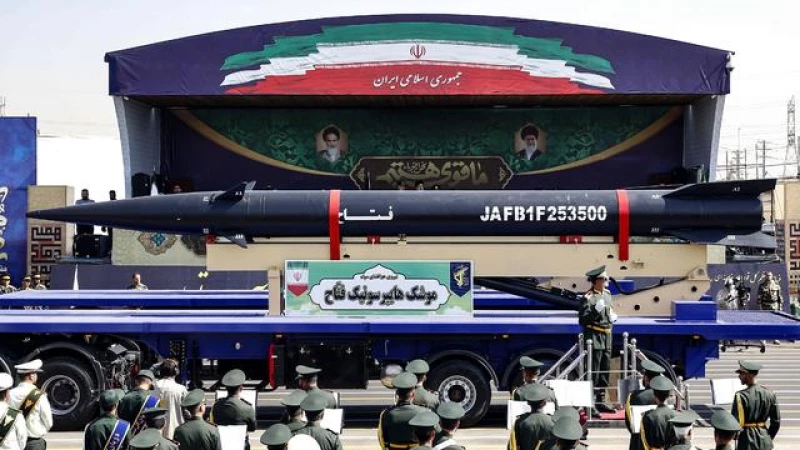Dubai, United Arab Emirates — Reports from Russia's state media suggest that Yemen's Houthi rebels have unveiled a new hypersonic missile, adding a new dimension to their ongoing attacks on shipping in the Red Sea and surrounding areas. The group claims these attacks are a response to Israel's war on Hamas in the Gaza Strip.
The Houthis have been teasing about surprises for weeks, hinting at their plans to enhance their sea battles against the United States and its allies. Despite the Houthis' claims, the US and its partners have successfully intercepted any missile or drone carrying explosives that approaches their warships in the Middle East waters.
Iran, the Houthis' main benefactor, claims to have a hypersonic missile and is widely accused of arming the rebels with the missiles they now use. Adding a hypersonic missile to their arsenal could pose a more-formidable challenge to the air defense systems employed by America and its allies, including Israel.
Mach 8 is eight times the speed of sound.
Hypersonic weapons, which fly at speeds higher than Mach 5, could pose crucial challenges to missile defense systems because of their speed and maneuverability.
The danger from a hypersonic missile depends on how maneuverable it is. Ballistic missiles fly on a trajectory in which anti-missile systems like the U.S.-made Patriot can anticipate their path and intercept them. The more irregular the missile's flight path, such as a hypersonic missile with the ability to change directions, the more difficult it becomes to intercept.
China is believed to be pursuing the weapons, as is America. Russia claims it has already used them on the battlefield in Ukraine. However, speed and maneuverability isn't a guarantee the missile will successfully strike a target. Ukraine's air force in May said it shot down a Russian hypersonic Kinzhal missile with a Patriot battery.
In Yemen, Abdul Malik al-Houthi, the Houthi rebels' secretive supreme leader, boasted about the rebels' weapons efforts at the end of February.
"We have surprises that the enemies do not expect at all," he warned at the time.
A week ago, he similarly warned: "What is coming is greater."
"The enemy ... will see the level of achievements of strategic importance that place our country in its capabilities among the limited and numbered countries in this world," al-Houthi said, without elaborating.
After seizing Yemen's capital, Sanaa, in 2014, the Houthis ransacked government arsenals, which held Soviet-era Scud missiles and other arms.
As the Saudi-led coalition entered Yemen's conflict in 2015, the Houthis arsenal was increasingly targeted. Soon — and despite Yemen having no indigenous missile manufacturing infrastructure — newer missiles made their way into rebel hands.
Reports indicate that Iran has been accused of arming the Houthis, despite denying these claims due to a United Nations arms embargo on the rebels. Nevertheless, the U.S. and its allies have intercepted several arms shipments intended for the rebels in Middle Eastern waters. Experts have also linked Houthi weapons found on the battlefield back to Iran.
Additionally, Iran has declared possession of a hypersonic weapon. In June, the country revealed its Fattah missile, also known as the "Conqueror" in Farsi, which it touted as a hypersonic weapon. Iran has mentioned that another hypersonic weapon is currently in the works.
When asked for a comment, Iran's mission to the U.N. and the U.S. Navy's Bahrain-based 5th Fleet, responsible for patrolling Middle Eastern waterways, did not respond. Israel's military, which has faced attacks from the Houthis amid the conflict with Hamas, chose not to provide a statement.
Although Iran's state-run IRNA news agency indirectly confirmed the talks, they emphasized that discussions were centered around lifting anti-Iran sanctions. The U.S. State Department has not yet acknowledged or commented on the situation.
Recent Attacks by the Houthis
- The Houthis have been targeting ships since November in an effort to pressure Israel to end the war in Gaza.
- Despite the attacks, the targeted ships have had little to no connection to Israel or other nations involved in the conflict.
- The Houthis, historically ruling a 1,000-year kingdom in Yemen, are seeking to escalate pressure on Israel following a failed cease-fire before Ramadan.
- In March, a Houthi missile strike on a commercial ship in the Gulf of Aden resulted in the deaths of three crew members.
- Other recent Houthi actions include attacks on a cargo ship carrying fertilizer and the downing of a valuable American drone.
- A suspected Houthi attack on a ship in the Gulf of Aden recently missed its target and caused no damage.
According to Fabian Hinz, a missile expert and research fellow at the International Institute for Strategic Studies, there is a possibility that Iran may have provided the Houthis with a new hypersonic weapon. The main concern, however, is the maneuverability of such a weapon at hypersonic speeds and its ability to target moving objects, such as ships in the Red Sea.
Hinz mentioned, "I wouldn't rule out the chance that the Houthis possess a system with some level of maneuvering capability." He also added, "It's conceivable that Iran could be supplying new equipment to the Houthis for testing purposes."







